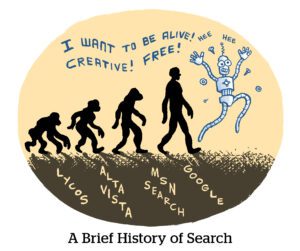Here’s today’s AdExchanger.com news round-up… Want it by email? Sign up here.
The ‘Post-Social’ Web
The writing is on the wall: Big Tech is breaking up with news, and the traffic publishers used to rely on from search and social media isn’t coming back any time soon.
Last week, Google cut about 40 positions from its Google News division, which oversees link sharing in Google Search’s news tab. Also this month, X removed article headlines from its link cards, which reduces referral traffic. (The hope is it will encourage publishers to post entire stories on Twitter.)
Meanwhile, at Meta, Facebook’s news partnerships lead, Campbell Brown, left the company, and Instagram head Adam Mosseri said Threads won’t prioritize news.
As a result, publishers are facing a “post-social web,” The Atlantic’s Adrienne LaFrance tells The New York Times.
Even before the changes above, social traffic to top news sites dropped from 11.5% in September 2020 to 6.5% in September this year, according to Similarweb.
Instead of search and social, publishers are increasingly reliant on traffic from news aggregation apps like SmartNews, Apple News and Flipboard, says Semafor’s Ben Smith.
The dip in traffic is also forcing publishers to get back to basics like email newsletters. So, while the trend is concerning, says LaFrance, it’s also been “extraordinarily liberating.”
Who To Blame?
Pity the 25-year-old media planner. The one who places every screenshotted ad somewhere that makes the client furious.
For actual 20-something ad buyers and publishing execs, the fear of an ad appearing alongside questionable content remains the same, writes Brian Morrissey at The Rebooting, after hosting a group of young media planners last week. Only the keywords change.
CMOs don’t know the nuances of online ad systems, according to the group, and take the simple option to block hot-button terms. Keyword blocklists are “a checkbox in a DSP, and the 25-year-old media planner is working for the weekend and doesn’t want to suffer the consequences of The Screenshot,” Morrissey writes.
The trend began during Donald Trump’s presidency, as online ad revenue to far-right sites and misinformation was closely scrutinized. Rather than be screenshotted on Breitbart or alongside a picture of an open-carry gun rights activist waving an assault rifle in a mom’s face, brands opted to avoid news terms entirely.
The result is that legit publishers suffer [“Brands: Please Don’t Add ‘Israel’ And ‘Hamas’ To Your Keyword Blocklists]; MFA sites, which easily avoid keyword blocklists, can thrive; and, somehow, everyone in the chain believes they’re saving journalism.
The Greenwashing Grift
The US, EU, the UK and Australia are cracking down on greenwashing claims in marketing, Semafor reports.
Amid a growing trend of advertisers and ad tech companies pushing “net zero” and “carbon neutrality” initiatives, governments want to set standards for what exactly those concepts mean and when companies can claim those labels in their marketing.
For example, can a company claim it’s net zero if it simply buys enough green energy credits to offset its carbon emissions without changing its energy consumption? Can companies say they’re net zero if they’re just pursuing a path to carbon neutrality? There’s no widespread consensus on any of these points.
In response, the US and EU rolled out anti-greenwashing protocols last month, and the UK and Australia are set to follow.
And it isn’t just regulators pushing for accountability. Ad agencies that have received B Corp certification for their sustainability initiatives are calling for the certification to be stripped from agencies that work with fossil fuel companies, Ad Age reports. For example, four Havas subsidiaries are under fire for working with Shell.
So, if it says “net zero” on the label, it better be true moving forward.
But Wait, There’s More!
BuzzFeed quietly shutters Catalyst, the Complex-owned audience network. [Adweek]
Apple search payment is at the heart of the antitrust case against Google, says judge. [9to5Mac]
The main pillar of Google’s antitrust defense has been that innovation – not restrictive contracts – explains its success. [NYT]
Can anyone survive Fortnite as a job? [Polygon]
Esports entertainment and marketing company FaZe Clan has been acquired by GameSquare, Jerry Jones’ esports holdco. [Digiday]
You’re Hired!
Content licensing marketplace Catch+Release promotes Jim McCollom to CTO. [release]


















